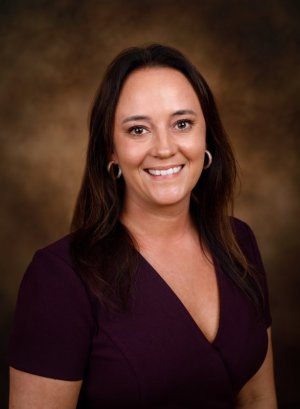Democrat Alonna Berry and Republican Nikki Miller are running for the chance to represent District 20, filling the seat left empty last legislative session by Rep. Stell Parker Selby, D-Milton.
Voters will decide Tuesday, Aug. 5, whom they will send to Dover. The Cape Gazette asked the candidates several questions on local issues.
Age: 35
Current Hometown: Milton
Family: Wife and mother of two boys under the age of 3, living with husband and four pets (two dogs and two cats)
Education: Bachelor’s degree from Syracuse University; master’s degree from Wilmington University; post-graduate certificate from University of Pennsylvania; doctoral candidate (Ed.D.) at Wilmington University
Relevant Experience: Multi-generational Sussex Countian; wife, daughter and granddaughter of U.S. military veterans; advocate; teacher; instructional coach; school founder; professor; policy advisor; former statewide community services director; nonprofit executive
Everyone agrees traffic has become unbearable in the Cape Region. What intersection or roadway do you believe is problematic, and if elected representative, what would you do to improve the situation?
Berry: As a former staff member in the governor’s office, I understand how complex road projects can be and how dangerous they can be for drivers if unresolved. The intersection at Route 9 and Hudson Road is a prime example of growth outpacing infrastructure. Too often, we are playing catch-up. It’s dangerous, congested and a daily frustration for locals. If elected, I will work with the Delaware Department of Transportation, Sussex County Council and my fellow legislators to prioritize long-delayed projects in Sussex. We can’t keep building without a plan to move people safely.
Miller: Narrowing the cause down to just one problematic intersection understates the problem because there are so many. But if I had to highlight one, it would be the intersection of Route 1 and Cave Neck Road. Since the opening of the Broadkill overpass, drivers heading south are essentially being funneled into a hurry-up-and-wait scenario once they get over the Nassau Bridge. As this occurs, critical crossover points like Cave Neck have become extremely dangerous, one might say even deadly. Recently, a close family friend was T-boned trying to cross Route 1 to visit my home. Thankfully, no one was seriously hurt, but the car was totaled, and it easily could have been worse. The lack of a traffic light or proper traffic control at that intersection allows cars to exceed the speed limit, putting other motorists in grave danger. I understand there is a long-term plan to eliminate these crossovers, but perhaps this should have been addressed before opening the bypass. Prioritizing motorists’ safety should always be the focus of DelDOT. When elected, I will advocate and work to ensure that future transportation projects put the needs and safety of residents and visitors first. We all deserve safe roads. This must be a priority and not an afterthought.
Do you agree with taxing residents to raise revenue, or raising fees on goods and services to bring more money into the state budget?
Berry: In my previous role, I sat in the governor's office and went line-by-line making tough decisions to ensure our families and communities have what they need to thrive in our state. As your legislator in Dover, I would fight for a balanced, fiscally responsible approach that puts people first. I have the experience to get that done. Before considering any increase in taxes or fees, we must ensure everyone is paying their fair share. We also need to evaluate whether current budget lines are effectively supporting communities across the state, particularly in Sussex. A balanced budget is essential, but so is long-term planning to protect the programs and services that future generations will rely on.
Miller: All too often, raising taxes is the first option that government adopts. I don’t support raising taxes on residents without first taking a hard look at how our current tax dollars are being spent. Before asking families to pay more, we need to ensure our budget is transparent, efficient and focused on the correct priorities like infrastructure, education, healthcare and public safety. After a critical review of our spending, exploring ways to grow Delaware’s economy by attracting businesses and investment is the more prudent and time-tested path to increasing revenue. If additional revenue is needed, we should then look at fair, targeted options like modest increases in tourism-related fees or luxury services rather than placing the burden on local families.
Would you support a plan to consolidate school districts?
Berry: Throughout my career in education as a teacher, instructional coach, Department of Education employee, education policy advisor for the governor's office and school founder, I’ve had to navigate our school funding system and its impact from every seat. Our school funding system is outdated and inequitable, which is and has been driving many of the conversations around school consolidation for years. Before we talk about consolidating districts, we must fix how schools are funded. I’ve spent 15 years as an educator working alongside state leaders, school CFOs and community partners to modernize Delaware’s funding formula. I’m ready to go to Dover and finish that work, because every student in every ZIP code deserves to learn.
Miller: I think it’s important to take a thoughtful, measured approach when it comes to school district consolidation. It would be premature for me to support or oppose a plan to consolidate school districts before having a sense of how it would impact the students, teachers, taxpayers and the community at large. I am very interested in learning more about what consolidating Delaware’s school districts would look like. I will support giving school districts more flexibility in how they use their funds. Local leaders understand the unique needs of their schools better than anyone, and having been in district leadership, I believe that empowering them to allocate resources as they see fit will lead to better outcomes without restructuring entire systems. Before pursuing consolidation, we need to explore all options that improve efficiency and educational quality while keeping local communities strong and intact.
Bills were passed in the legislature this past session that some believe undermine local control in Sussex County. Do you agree with bills that were passed to override local decisions on marijuana retail sales and offshore wind power?
Berry: No legislative action should override the needs and concerns of our constituents. At the same time, local control shouldn’t be used to discriminate or prevent legal access to state-regulated industries. I’ve spent my career bringing people together when the task is hard or the topic is complicated. Every time, we’ve been able to get the job done. We need a balanced approach that respects both state policy and local input. If elected, I would work to survey the residents of District 20 to better understand their perspectives, and I would fight to make sure their voices are heard and respected. We need someone who can get the job done for our state. I can do that for District 20 in Dover.
Miller: I do believe Sussex County’s local community decisions were undermined this past legislative session. We have separate levels of government for a reason, and it's the job of our county council and local municipalities to make decisions that reflect the needs and priorities of our local communities. When the state overrides those decisions, especially on major issues like offshore wind power, it sets a troubling precedent. I do not agree with the legislature stepping in to overturn those local decisions. Sussex, Kent and New Castle counties, and our local communities and their elected leaders, must have a real voice in shaping their own futures, which I will ensure they do by working with them in a collaborative manner. And that’s why when I’m elected, I can assure you that I will never forget the needs of my constituents. My leadership experience has proven that I can get work done and, more importantly, that I know how to be an effective advocate. I will fight to protect local control, and I’ll bring common-sense solutions and responsive constituent service to the table every single day. I’m not running to make headlines; I’m running to make a difference for my previous students, their parents, my neighbors and the others who live here.
Voting information
Early voting began July 24, and will continue 7 a.m. to 7 p.m., Friday, July 25 through Tuesday, July 29, with the exception of Sunday, July 27.
From Wednesday, July 30 to Sunday, Aug. 3, early voting will be held 11 a.m. to 7 p.m.
Early voting sites are Lewes Elementary School, 820 Savannah Road, Lewes, and Mariner Middle School, 16391 Harbeson Road, Milton.
On Election day, polls will be open 7 a.m. to 8 p.m., Tuesday, Aug. 5, and residents can vote at their assigned polling site.
- Milton Elementary School, 512 Federal St., Milton
- Mariner Middle School, 16391 Harbeson Road, Milton
- H.O. Brittingham School, 402 Mulberry St., Milton
- The Crossing, 15183 Coastal Highway, Milton
- Sussex Consortium, 17344 Sweetbriar Road, Lewes
- Frederick Thomas Middle School, 910 Sussex Drive, Lewes
- Lewes Public Library, 111 Adams Ave., Lewes
- Lewes Elementary School, 820 Savannah Road, Lewes.
Melissa Steele is a staff writer covering the state Legislature, government and police. Her newspaper career spans more than 30 years and includes working for the Delaware State News, Burlington County Times, The News Journal, Dover Post and Milford Beacon before coming to the Cape Gazette in 2012. Her work has received numerous awards, most notably a Pulitzer Prize-adjudicated investigative piece, and a runner-up for the MDDC James S. Keat Freedom of Information Award.
























































